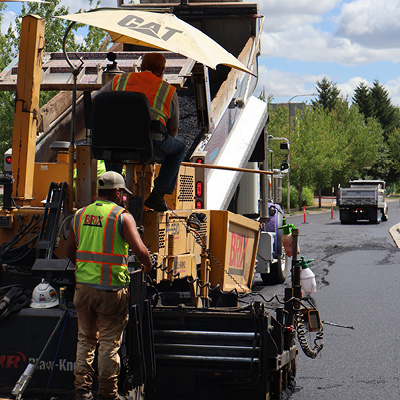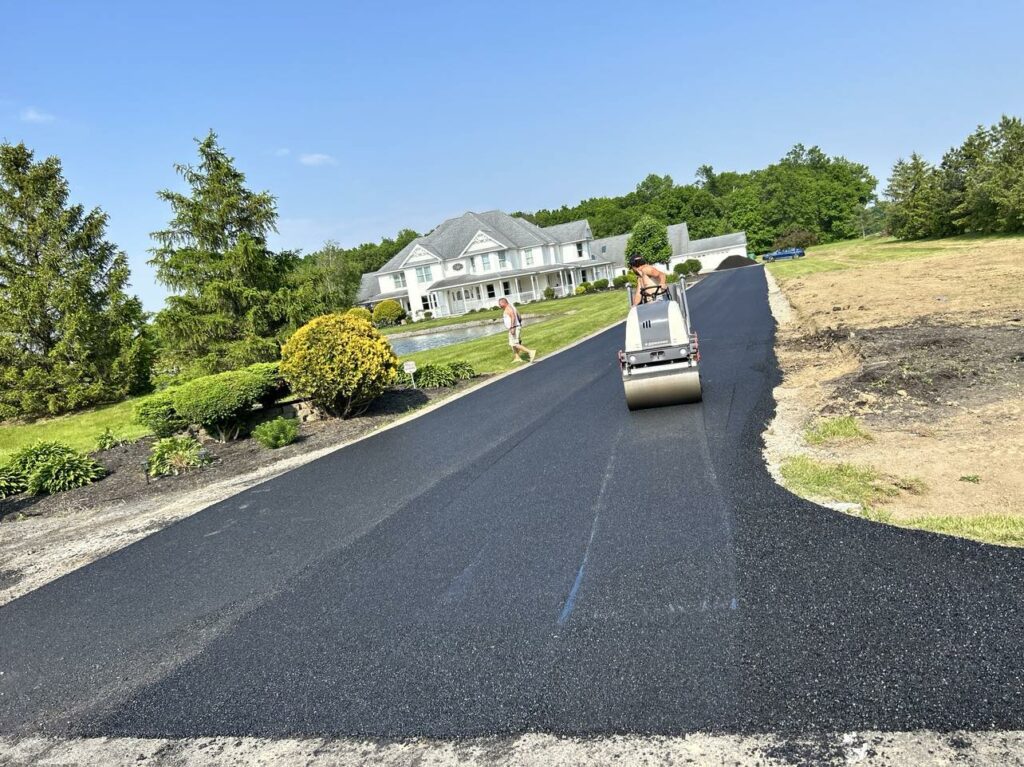Discovering the Various Sorts Of Asphalt Paving and Their Advantages
The landscape of asphalt paving includes a range of kinds, each engineered to deal with certain needs and ecological considerations. From the robust features of Hot Mix Asphalt to the environmentally friendly attributes of Recycled Asphalt Sidewalk, understanding these alternatives can considerably influence job results. Additionally, developments such as Cozy Mix Asphalt and Porous Asphalt introduce additional layers of effectiveness and sustainability. As we explore these different paving options, the nuanced benefits they supply may stun you and possibly change your approach to future paving tasks.
Hot Mix Asphalt
When thinking about one of the most effective leading services, warm mix asphalt (HMA) sticks out as a top choice for several applications (paving). HMA is a flexible paving material recognized for its resilience, versatility, and total efficiency. It is produced by home heating asphalt binder and combining it with aggregates at high temperature levels, making certain an uniform blend that can hold up against numerous environmental problems
One of the main benefits of HMA is its capacity to supply a smooth, skid-resistant surface area, enhancing security for automobiles and pedestrians alike. In addition, HMA shows excellent resistance to contortion, making it perfect for high-traffic areas such as freeways and car park. Its adaptability to different climates further adds to its extensive use.
The setup process of HMA is fairly quick, enabling effective task conclusion with marginal interruption to web traffic. In addition, it can be reused, reducing waste and promoting sustainability within the construction market. Overall, warm mix asphalt continues to be a leading option for leading experts as a result of its durable performance attributes and long-term cost-effectiveness, making it a trusted solution for various framework demands
Warm Mix Asphalt
Cozy mix asphalt (WMA) offers a cutting-edge choice to warm mix asphalt, supplying similar advantages while needing lower production temperatures. Commonly produced at temperature levels between 190 ° F and 250 ° F, WMA innovation reduces energy usage and greenhouse gas exhausts throughout production, making it an extra eco-friendly alternative.
This adaptability can lead to boosted compaction and overall resilience of the asphalt surface. In addition, WMA can be made use of in numerous applications, varying from highways to domestic driveways, without compromising performance.

The incorporation of ingredients or changed binders in WMA adds to its boosted properties, ensuring that it satisfies or exceeds efficiency requirements. WMA's decreased thermal impact during production can lower the possibility of damages to the surrounding atmosphere, making it an appealing choice for lasting paving methods.
Cold Mix Asphalt
Cold mix asphalt is a versatile paving option commonly used for temporary repairs and low-traffic locations. This type of asphalt is produced at ambient temperatures, making it a hassle-free choice for fast repairs and projects where conventional warm mix asphalt may not be feasible. The mixture generally is composed of asphalt binder, aggregate, and ingredients, allowing it to stay convenient for a prolonged duration.
Among the main benefits of cold mix asphalt is its convenience of application. It can be installed without specific equipment, making it accessible for smaller sized specialists and do it yourself fanatics. Additionally, chilly mix can be applied in numerous weather, which is specifically helpful for urgent repair work demands.

Cold mix asphalt is also economical, as it enables economical repairs without sacrificing top quality. Its flexibility makes it suitable for covering splits, filling up cracks, and resurfacing driveways. It may not offer the very same lasting toughness as warm mix asphalt, its quick application and versatility make it an excellent selection for momentary services and click for more info low-traffic applications. In general, cool mix asphalt continues to be a sensible alternative in the asphalt paving landscape.
(more about this)
Porous Asphalt
Porous asphalt is an innovative paving remedy developed to enhance stormwater management and minimize surface area overflow. This sort of asphalt features a special framework that integrates interconnected gaps, enabling water to permeate through the surface area and into the underlying layers. By facilitating natural drainage, porous asphalt aids alleviate the danger of flooding and lessens the burden on local stormwater systems.
Among the primary benefits of permeable asphalt is its capacity to boost water high quality. As stormwater filters through the sidewalk, contaminants and debris are trapped, lowering the number of contaminants that enter regional rivers. This adds to much healthier ecosystems and sustains conformity with ecological laws.
Additionally, porous asphalt can improve the longevity of the sidewalk itself. By decreasing water buildup on the surface area, it reduces the capacity for freeze-thaw cycles that can cause cracking and deterioration. The reduced requirement for conventional stormwater monitoring infrastructure can result in cost savings for towns and designers.
Recycled Asphalt Pavement
(view more)Recycled asphalt sidewalk (RAP) represents a sustainable method to roadway building and construction and maintenance that profits both the setting and the economy. By recycling existing asphalt materials, RAP minimizes the demand for brand-new basic materials, which subsequently saves natural sources and decreases ecological effect. This technique decreases energy usage and greenhouse gas emissions related to the production of new asphalt.
The consolidation of RAP into new sidewalk mixtures can also result in substantial expense savings. Specialists can utilize recycled products to decrease general project expenses, making it an economically viable option for districts and exclusive designers alike. Furthermore, RAP provides equivalent efficiency attributes to virgin asphalt, ensuring resilience and longevity in roadway surface areas.
RAP's convenience permits it to be used in various applications, including highways, parking area, and property driveways. By boosting the structural honesty of existing pavements, RAP adds to boosted safety and security and smoothness of roadways.
Final Thought
Warm Mix Asphalt excels in durability and rapid setup for high-traffic areas, while Warm Mix Asphalt improves sustainability through minimized power consumption. Cold Mix Asphalt serves as a cost-effective choice for immediate fixings, Porous Asphalt efficiently manages stormwater, and Recycled Asphalt Pavement promotes environmental responsibility.